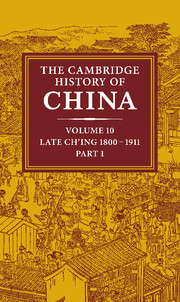Book contents
- Frontmatter
- 1 Introduction: the old order
- 2 Ch'ing Inner Asia c. 1800
- 3 Dynastic decline and the roots of rebellion
- 4 The Canton trade and the Opium War
- 5 The creation of the treaty system
- 6 The Taiping Rebellion
- 7 Sino-Russian relations, 1800–62
- 8 The heyday of the Ch'ing order in Mongolia, Sinkiang and Tibet
- 9 The Ch'ing Restoration
- 10 Self-strengthening: the pursuit of Western technology
- 11 Christian missions and their impact to 1900
- Bibliographical essays
- Bibliography
- Genealogical chart
- Glossary
- Index
- References
4 - The Canton trade and the Opium War
Published online by Cambridge University Press: 28 March 2008
- Frontmatter
- 1 Introduction: the old order
- 2 Ch'ing Inner Asia c. 1800
- 3 Dynastic decline and the roots of rebellion
- 4 The Canton trade and the Opium War
- 5 The creation of the treaty system
- 6 The Taiping Rebellion
- 7 Sino-Russian relations, 1800–62
- 8 The heyday of the Ch'ing order in Mongolia, Sinkiang and Tibet
- 9 The Ch'ing Restoration
- 10 Self-strengthening: the pursuit of Western technology
- 11 Christian missions and their impact to 1900
- Bibliographical essays
- Bibliography
- Genealogical chart
- Glossary
- Index
- References
Summary
CHARACTERISTICS OF THE TRADE
The essence of the Canton system by which China's European trade was regulated from 1760 to 1834 was hierarchic subordination: first, of the foreign traders to the licensed Chinese monopolists, known collectively as the ‘Cohong’; and second, of the Cohong members to the imperially-appointed superintendent of maritime customs at Canton, known to Westerners as the ‘Hoppo’. In legal-political terms, power was exerted downward in this hierarchy. The imperial officials at Canton, not only the Hoppo but also the governor of Kwangtung and the governor-general (or ‘viceroy’) of Kwangtung and Kwangsi, issued orders and regulations to the Cohong members and might jail or disgrace them for non-compliance; and they customarily refused any direct contact with the British East India Company's Select Committee at Canton, preferring to transmit orders to them via the hong merchants.
In economic terms, however, power was more equitably distributed because of a discrepancy between the formal Confucian rationale for the Canton system and the real interests of its participants. The system had grown up as an expression of China's traditional effort to achieve stability in foreign relations by permitting a limited trade to those who either presented tribute or were quarantined at entrepôts on the frontier, as the Russians were at Kiakhta (Mai-mai-ch'eng) and the Europeans after 1760 at Canton. In public Ch'ing policy expressions, commercial interests were subordinated to political raisons d'état. But in private, even Ch'ing emperors viewed the Canton trade as an important source of personal profit. Although the Hoppo was mistaken by foreigners for a representative of the Board of Revenue (Hu Pu), he was actually delegated by the Imperial Household (Nei-wu Fu) to transmit as much as 855,000 taels of the annual Canton customs duties to the ruler's privy purse.
- Type
- Chapter
- Information
- The Cambridge History of China , pp. 163 - 212Publisher: Cambridge University PressPrint publication year: 1978
References
- 23
- Cited by

